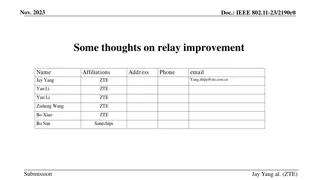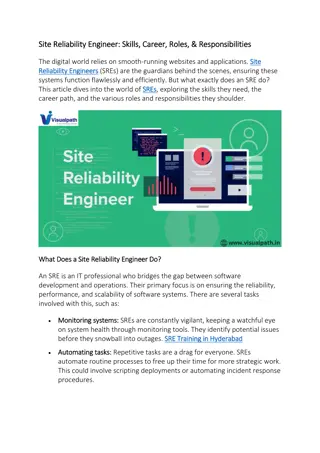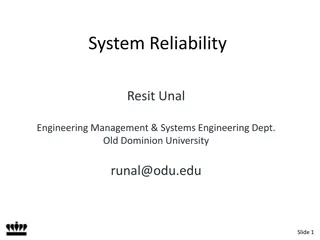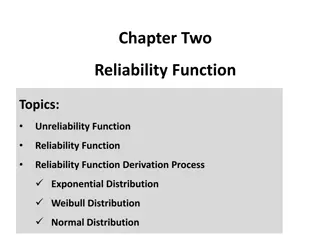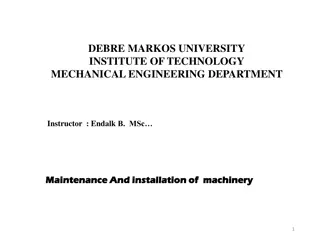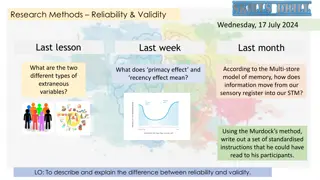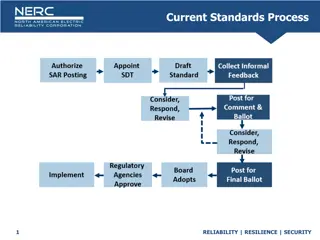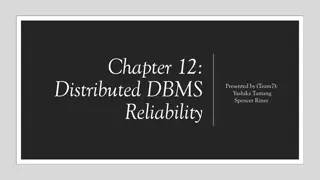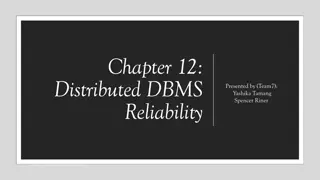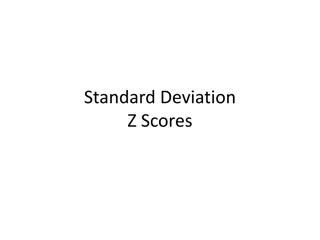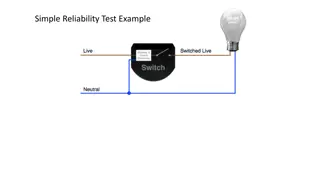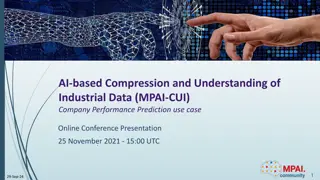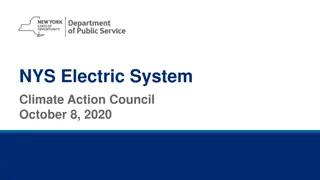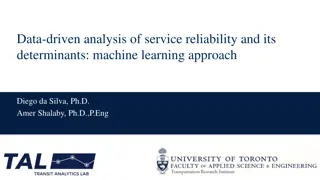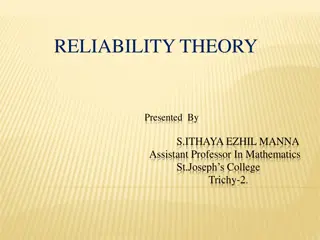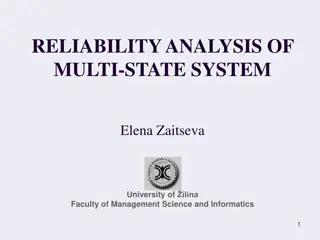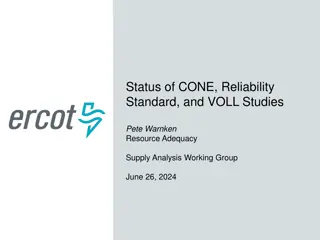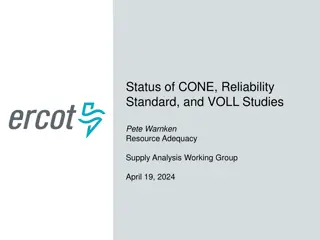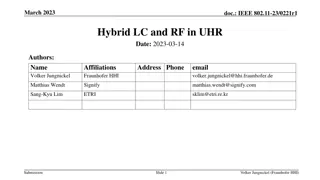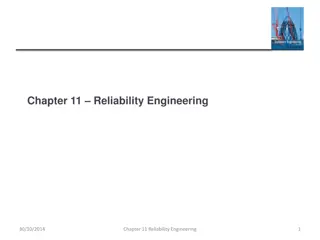Software Engineering and Architecture
Reliability in software systems is crucial, as defects can lead to failures impacting reliability. The number of defects directly affects the system's reliability. Not all defects are equal, so prioritizing defect correction based on return on investment is essential. Testing thoroughly, especially
1 views • 40 slides
Enhancing Wi-Fi Relay Networks for Improved Coverage and Reliability
This document discusses the need to enhance relay frameworks in Wi-Fi networks to improve coverage, reliability, and performance of stations in different ranges. It highlights the challenges of S1G-based relays, proposes enhancements to the relay framework, and introduces new types of relay framewor
1 views • 12 slides
DRRS Design to Meet HB1500 Intent
DRRS design aims to meet the requirements of HB1500 in determining the quantity of services needed for reliability standards in ERCOT grid operations. The primary goal is to ensure operational reliability during extreme events with a focus on dispatchable generation facilities. DRRS resources must b
0 views • 6 slides
Site Reliability Engineering Online Training | Hyderabad
Visualpath offers an effective Site Reliability Engineering Online Training Program. To schedule a free demo, simply reach out to us at 91-9989971070.\nVisit \/\/ \/site-reliability-engineering-sre-online-training-hyderabad.html\nWhatsApp: \/\/ \/catalog\/919989971070\/\n
0 views • 9 slides
Site Reliability Engineering Training Institute in Hyderabad - SRE
Visualpath provides the best SRE Training Course in Hyderabad by real-time experts we are providing a Site Reliability Engineering Course that is available globally in India, the USA, the UK, Canada, Dubai, and Australia To book a demo, please get in touch with us at 91-9989971070.\nVisit \/\/ \/si
2 views • 3 slides
System Reliability in Engineering
System Reliability in Science/Engineering involves understanding how products/systems work, as well as the ways they fail and the effects of failures. Reliability is the probability that a system will perform as expected under given conditions and play a crucial role in the design phase to mitigate
0 views • 19 slides
Reliability Functions in Data Analysis
Reliability functions play a crucial role in data analysis, providing insights into the probability of success or failure over time. This chapter delves into topics like unreliability functions, derivation processes for reliability functions using distributions like exponential, Weibull, and normal.
0 views • 19 slides
Reliability in Mechanical Engineering
Reliability in mechanical engineering pertains to the ability of a product to perform as expected over a specified period under defined operational conditions. This article delves into the factors influencing reliability, such as numerical value, intended function, product life, and operating condit
0 views • 61 slides
Reliability and Failure Analysis in Engineering Systems
Introduction to failure data analysis, goodness of fit testing, stress-strength modeling, and reliability evaluation in engineering systems. Learn about failure rate estimation, MTBF/MTTF calculations, and practical examples illustrating reliability metrics in industrial applications.
0 views • 27 slides
Research Methods: Reliability and Validity in Psychological Studies
In psychological research, understanding reliability and validity is crucial. Reliability refers to consistency in measurements, while validity focuses on whether the results accurately represent the phenomenon being studied. Ensuring both reliability and validity enhances the credibility of researc
0 views • 13 slides
Current Standards Process for Reliability, Resilience, and Security
The current standards process focuses on ensuring reliability, resilience, and security in regulatory directives. It involves remanding standards to committees, convening technical conferences, re-ballingoting within 45 days, and considering input for further work. The process also covers the initia
1 views • 8 slides
Distributed DBMS Reliability Concepts and Measures
Distributed DBMS reliability is crucial for ensuring continuous user request processing despite system failures. This chapter delves into fundamental definitions, fault classifications, and types of faults like hard and soft failures in distributed systems. Understanding reliability concepts helps i
1 views • 58 slides
Distributed DBMS Reliability Overview
This chapter delves into the critical aspect of reliability in distributed database management systems (DBMS). It explores the concepts, measures, types of faults, and the significance of maintaining atomicity and durability properties of transactions in ensuring system reliability. The narrative hi
4 views • 51 slides
Standard Deviation, Variance, and Z-Scores
Explore the importance of variation in interpreting data distributions, learn how to calculate standard deviation, understand z-scores, and become familiar with Greek letters for mean and standard deviation. Discover the significance of standard deviation in statistical analysis and the difference b
2 views • 18 slides
Workplace Exposure Standard for Silica Dust in Stone Benchtop Fabrication
Reduction in workplace exposure standard for respirable crystalline silica dust has been implemented, halving the national standard to 0.05 mg/m3. The new standard aims to protect workers in stone benchtop fabrication businesses from serious lung diseases caused by breathing in silica dust. Employer
1 views • 8 slides
Update on Transmission System Performance Standard TPL-007-1 for Geomagnetic Disturbance Events
The status update covers the evolution of Reliability Standard TPL-007-1, focusing on the approval process, modifications required by FERC, and directives for NERC to enhance the standard. TPL-007-1 aims to assess vulnerability to geomagnetic disturbances and mandates corrective actions for non-comp
1 views • 11 slides
Jordan Atomic Energy Commission Human Reliability Program Overview
Explore the comprehensive Human Reliability Program implemented by the Jordan Atomic Energy Commission for the Research and Training Reactor facility. The program focuses on nuclear security, physical security, cyber security, and fostering a culture of reliability and trustworthiness among employee
5 views • 25 slides
Quick and Dirty Validation of GEFS Reforecast Calibrated Precipitation Forecasts
Validation of GEFS reforecast calibrated precipitation forecasts against NARR analyses, focusing on reliability, upper and lower tercile outcomes, and Brier skill scores for different lead times. Challenges with NARR analyses in capturing snowfall events in the northern Great Plains are discussed, s
0 views • 9 slides
Simple Reliability Test Example for Bulbs
Understanding reliability testing for bulbs involves testing failure rates, predicting longevity based on on/off cycles, and analyzing data to determine failure patterns. This example demonstrates collecting data, plotting results, fitting Normal curves, and using life distribution output profilers
0 views • 8 slides
NERC Operating Committee Update & Strategic Plan Overview
The NERC Operating Committee (OC) oversees critical operational reliability matters within the electricity sector, aligning with the organization's strategic plan for the next five years. Led by Chair Jim Case and Vice-chair Lloyd Linke, the OC collaborates with various stakeholders, focusing on eme
0 views • 15 slides
Enhancing NAND Flash Memory Chip-Off Forensic Analysis Reliability
This study focuses on improving the reliability of chip-off forensic analysis of NAND flash memory devices. By identifying error sources, quantifying errors, and proposing mitigation processes, the research emphasizes the impact of storage time and heat on errors introduced in chip-off analysis. The
0 views • 26 slides
Optimizing Data Center Costs with Heterogeneous-Reliability Memory
Reducing data center costs while meeting availability targets is the focus of this study on memory error vulnerabilities. By employing a heterogeneous-reliability memory approach, storing error-tolerant data in less reliable memory and error-vulnerable data in more reliable memory, significant savin
0 views • 51 slides
Enhancing Reliability, Resilience, and Security in Electrical Infrastructure
The project outlines modifications to NERC standards FAC-001 and FAC-002 aimed at improving reliability, resilience, and security in the electrical sector. Key agenda items include administrative reviews, antitrust compliance guidelines, and public disclaimers. The focus is on clarifying responsibil
0 views • 14 slides
AI-Based Compression and Understanding of Industrial Data (MPAI-CUI) - Company Performance Prediction Use Case
AI-based Compression and Understanding of Industrial Data (MPAI-CUI) is a standard developed by the MPEG standards group. This standard focuses on transforming data into a more suitable format for applications. The presentation will cover the introduction to MPAI, applications, a demo for anonymous
0 views • 25 slides
IEEE 2018 Emerging Technologies Reliability Roundtable Summary
The IEEE 2018 Emerging Technologies Reliability Roundtable took place in Austin, Texas, featuring speakers from various technology companies discussing topics such as software reliability, 5G network challenges, and ultra-reliability in wireless communication. The agenda included insightful talks, Q
0 views • 11 slides
ACE RAM Workshop - Barcelona 2019: Reliability and Maintenance Concepts
The ACE RAM Workshop conducted by George Pruteanu in Barcelona focused on topics such as RAM prediction, FMEA, maintenance concepts, preventive and predictive maintenance, condition monitoring systems, corrective maintenance, and design for maintenance. The workshop delved into reliability predictio
0 views • 16 slides
Overview of New York State Electric System Climate Action Council
The New York State Electric System Climate Action Council, as of October 8, 2020, oversees the bulk and distribution systems, rate case processes, utility operating revenues, residential electric bills, and statewide reliability metrics. The bulk system encompasses the NYISO-administered market for
0 views • 9 slides
Machine Learning Approach for Analyzing Service Reliability Factors in São Paulo Transit Data
Explore how machine learning methods are applied to analyze São Paulo transit data, focusing on factors affecting bus service reliability measures. The study delves into quantifying and identifying relevant factors impacting service reliability across different levels such as stops, routes, and the
0 views • 10 slides
Reliability Theory in Engineering and Mathematics
Reliability theory, presented by S. Ithaya Ezhil Manna, explains the concept of reliability as the probability of a component functioning properly over time. The theory defines reliability in terms of the random variable X representing component life or time to failure. Key points include the defini
0 views • 22 slides
Washington State Emission Performance Standard Rulemaking Stakeholder Meeting Overview
This document provides detailed insights into the first stakeholder meeting regarding the Emission Performance Standard Rulemaking in Washington State. It covers key agenda items, reviews of RCW 80.80 GHG Emission Performance Standard, definitions related to CCCT and baseload electric generation, an
0 views • 19 slides
Benefits of UCD Sequencer in Power Management Solutions
UCD Sequencer offers full flexibility without coding, improved power reliability, fault logging, easy monitoring, and the addition of digital power features. It enhances system reliability, reduces inventory costs, and improves the quality of end products in server monitoring and sequencing solution
0 views • 11 slides
Reliability Analysis of Multi-State Systems in Engineering
Analysis by Elena Zaitseva on the quantification of uncertainty in the behavior of multi-state systems, including binary-state and multiple-state systems. Discusses the principal problem in reliability engineering, the quantification of system models, and the structure function defining system perfo
0 views • 20 slides
Latest Updates on CONE, Reliability Standard, and VOLL Studies - June 26, 2024
Updates include the status of the CONE study report filed with PUCT, approval of the Reliability Standard proposal, and ongoing work on the Value of Lost Load study. The CONE study feedback and technology selection discussions were highlighted, along with the availability of certain SERVM model data
0 views • 4 slides
Update on Energy Supply Analysis Studies - April 2024
The report provides insights into the status of CONE, Reliability Standard, and VOLL studies conducted by Pete Warnken Resource Adequacy Supply Analysis Working Group. It covers discussions on After-Tax Weighted Cost of Capital (ATWACC), progress on the CONE study, updates on Reliability Standard Sc
0 views • 5 slides
Standard Deviation and Standard Error of the Means
Standard deviation measures the variability or spread of measurements in a data set, while standard error of the means quantifies the precision of the mean of a set of means from replicated experiments. Variability is indicated by the range of data values, with low standard deviation corresponding t
1 views • 7 slides
Integration of Light Communications for Enhanced Reliability in Multilink Operations
The presentation discusses the integration of Light Communications (LC) into the Multilink Operation (MLO) framework to enhance reliability and reduce latency in wireless communications. By proposing the incorporation of LC as a new offloading opportunity within the MLO framework, the potential for
0 views • 15 slides
Reliability Measures in Research Supervised by Dr. Mohammed Mahdi Sharifi
Reliability is crucial for assessing the consistency of metrics in research. Various methods such as inter-rater reliability, test-retest reliability, parallel forms reliability, and internal consistency reliability help ensure the dependability of research findings. By examining factors like judgme
0 views • 9 slides
Chapter 11 - Software Reliability and Fault Management
In software reliability engineering, understanding faults, errors, and failures is crucial. Explore fault management techniques including fault avoidance, detection, and tolerance to ensure dependable software. Discover how reliability requirements vary for different applications, from non-critical
0 views • 81 slides
Reliability
Reliability in testing is essential for obtaining consistent and dependable results. Explore threats to reliability, procedures for two administrations, issues to address, and the importance of one administration. Learn about internal consistency, inter-item consistency, reliability coefficients, an
0 views • 12 slides
Challenges in Modern IS: Reliability & Security
This week explores the challenges facing modern information systems in terms of reliability, security, and dependability. It delves into the significance of reliability, availability, and redundancy in ensuring system functionality and mitigating downtime risks. The session also discusses the import
0 views • 31 slides

